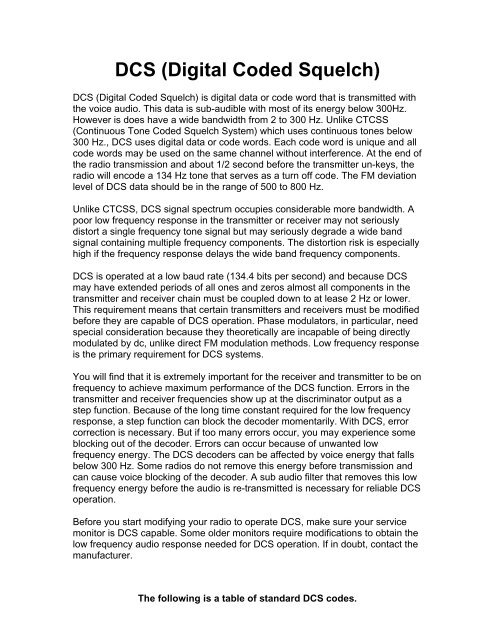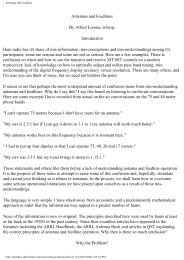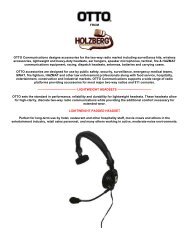DCS (Digital Coded Squelch) - Wadsworth Sales Incorporated
DCS (Digital Coded Squelch) - Wadsworth Sales Incorporated
DCS (Digital Coded Squelch) - Wadsworth Sales Incorporated
Create successful ePaper yourself
Turn your PDF publications into a flip-book with our unique Google optimized e-Paper software.
<strong>DCS</strong> (<strong>Digital</strong> <strong>Coded</strong> <strong>Squelch</strong>)<br />
<strong>DCS</strong> (<strong>Digital</strong> <strong>Coded</strong> <strong>Squelch</strong>) is digital data or code word that is transmitted with<br />
the voice audio. This data is sub-audible with most of its energy below 300Hz.<br />
However is does have a wide bandwidth from 2 to 300 Hz. Unlike CTCSS<br />
(Continuous Tone <strong>Coded</strong> <strong>Squelch</strong> System) which uses continuous tones below<br />
300 Hz., <strong>DCS</strong> uses digital data or code words. Each code word is unique and all<br />
code words may be used on the same channel without interference. At the end of<br />
the radio transmission and about 1/2 second before the transmitter un-keys, the<br />
radio will encode a 134 Hz tone that serves as a turn off code. The FM deviation<br />
level of <strong>DCS</strong> data should be in the range of 500 to 800 Hz.<br />
Unlike CTCSS, <strong>DCS</strong> signal spectrum occupies considerable more bandwidth. A<br />
poor low frequency response in the transmitter or receiver may not seriously<br />
distort a single frequency tone signal but may seriously degrade a wide band<br />
signal containing multiple frequency components. The distortion risk is especially<br />
high if the frequency response delays the wide band frequency components.<br />
<strong>DCS</strong> is operated at a low baud rate (134.4 bits per second) and because <strong>DCS</strong><br />
may have extended periods of all ones and zeros almost all components in the<br />
transmitter and receiver chain must be coupled down to at lease 2 Hz or lower.<br />
This requirement means that certain transmitters and receivers must be modified<br />
before they are capable of <strong>DCS</strong> operation. Phase modulators, in particular, need<br />
special consideration because they theoretically are incapable of being directly<br />
modulated by dc, unlike direct FM modulation methods. Low frequency response<br />
is the primary requirement for <strong>DCS</strong> systems.<br />
You will find that it is extremely important for the receiver and transmitter to be on<br />
frequency to achieve maximum performance of the <strong>DCS</strong> function. Errors in the<br />
transmitter and receiver frequencies show up at the discriminator output as a<br />
step function. Because of the long time constant required for the low frequency<br />
response, a step function can block the decoder momentarily. With <strong>DCS</strong>, error<br />
correction is necessary. But if too many errors occur, you may experience some<br />
blocking out of the decoder. Errors can occur because of unwanted low<br />
frequency energy. The <strong>DCS</strong> decoders can be affected by voice energy that falls<br />
below 300 Hz. Some radios do not remove this energy before transmission and<br />
can cause voice blocking of the decoder. A sub audio filter that removes this low<br />
frequency energy before the audio is re-transmitted is necessary for reliable <strong>DCS</strong><br />
operation.<br />
Before you start modifying your radio to operate <strong>DCS</strong>, make sure your service<br />
monitor is <strong>DCS</strong> capable. Some older monitors require modifications to obtain the<br />
low frequency audio response needed for <strong>DCS</strong> operation. If in doubt, contact the<br />
manufacturer.<br />
The following is a table of standard <strong>DCS</strong> codes.
023 131 251 371 532<br />
025 132 252 411 546<br />
026 134 255 412 565<br />
031 143 261 413 606<br />
032 145 263 423 612<br />
036 152 265 431 624<br />
043 155 266 432 627<br />
047 156 271 445 631<br />
051 162 274 446 632<br />
053 165 306 452 654<br />
054 172 311 454 662<br />
065 174 315 455 664<br />
071 205 325 462 703<br />
072 212 331 464 712<br />
073 223 332 465 723<br />
074 225 343 466 731<br />
114 226 346 503 732<br />
115 243 351 506 734<br />
116 244 356 516 743<br />
122 245 364 523 754<br />
125 246 365 526<br />
BRYAN WADSWORTH<br />
TOLL FREE # (888) 280-5290<br />
E-Mail: wb9mcw@gmail.com<br />
CELL PHONE (815) 790-4494<br />
SKYPE PHONE = bryan.wadsworth<br />
FAX (815) 363-6056




